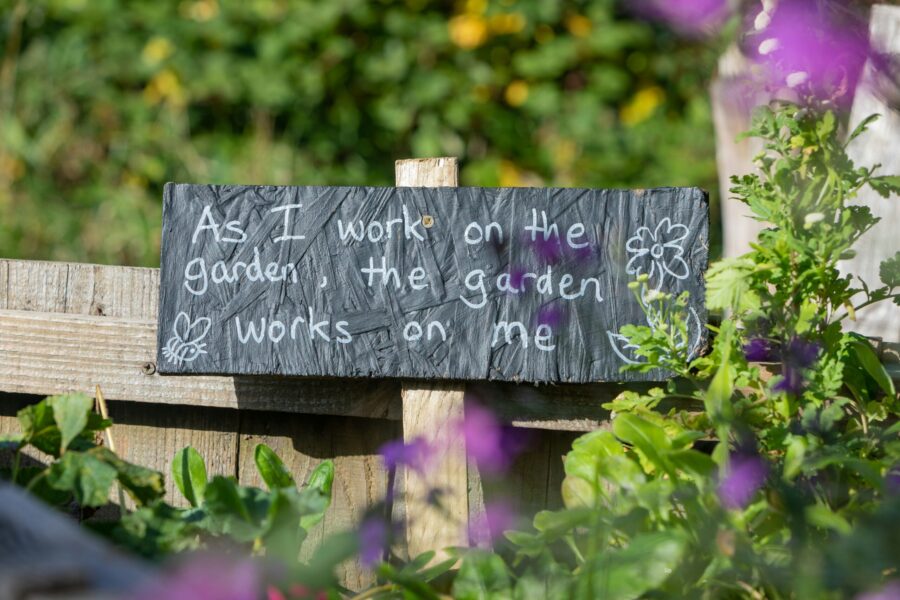Why Gardens Are So Good for You
“Inch by inch, row by rowGonna make this garden growAll it takes is a rake and a hoeAnd a piece of fertile ground…”
Children’s songs and nursery rhymes are full of gardens, and for good reason: there’s something about being in the garden that – deep down – is good for us.
According to experts from Texas A&M AgriLife, research shows that gardening is good for both your body and mind.
“Plant-related hobbies like gardening offer an opportunity to enjoy nature and give a person a more positive outlook on life,” said Charles Hall, Ph.D., professor and Ellison Chair in International Floriculture in the Department of Horticultural Sciences of the College of Agriculture and Life Sciences, Bryan-College Station.
Hall has conducted a host of research showing the manifold benefits of gardening and getting outdoors on mental and physical health:
- Lower anxiety and stress levels
- Attention deficit recovery – kids with ADHD concentrated better after a walk in the park
- Enhanced memory retention – taking short breaks outdoors can help your working memory
- Decreased depression
- Mitigated PTSD symptoms, increased hope, and improved quality of life
- Lower blood pressure
- Reduced dementia effects
- Improved mood and general life satisfaction
- Increased productivity and creativity
- Enhanced self-esteem
Spending time in nature gardening or engaging in other outdoor activities makes people feel more alive and energetic, said Hall, which “has a significant positive effect on a person’s overall mental health.”
Gardens are good for student attention and overall wellbeing
Students particularly benefit from gardening activities, Hall noted. Gardening quietly engages the mind, allowing it to enter a more relaxed state. It has a calming effect and gives a more positive outlook on the world around them.
When children have a view of green spaces during school hours, they perform significantly better on attention tests, he said.
“Gardening is conducive to generating a positive learning environment, reducing children’s tendency towards distraction and helping them better concentrate on schoolwork,” Hall said.
Even better when kids have access to an outdoor classroom or teaching garden. Texas A&M offers the Junior Master Gardener Program to introduce kids to the wonders of gardening. “These gardens provide opportunities for young people to improve their social, physical, psychological, cognitive, environmental and spiritual well-being,” Hall explained.
As soon a child steps onto a garden, his or her demeanor and attitude improve, added Randy Seagraves, curriculum coordinator for the Junior Master Gardener program in the Department of Horticultural Sciences.
“We see them slow down, pause and smile,” he said. “For many of these kids, being a part of a school garden project will be their very first garden connection. When young gardeners have the experience of planting and caring for something from seed to harvest, they get a sense of accomplishment, pride and ownership. It’s a real esteem-builder for them.”
Gardens are good for social interaction in schools
Not only are gardens good for promoting student attention, but in schools with classroom gardens, there are fewer cases of bullying and conflict, said Hall.
Teamwork helps foster community. “Children engaged in classroom gardens get to be outside, be physically active and work together toward a common goal. Maybe most importantly, they also get to understand how patience and persistence are needed for them to literally see the fruits of their labor,” he added.
Community gardens yield broad social benefits
Just as gardens benefit schools, they elevate whole communities. “Neighborhoods with a community garden are often more friendly and inviting,” Hall said. “And a community garden helps break down certain social barriers in that you will often see people of different backgrounds, ethnicities and economic levels collaborating on them. This sense of community is really the glue that makes a neighborhood special and allows people a chance to really get to know and understand one another.”
Gardening is of particular benefit to those in underserved communities. Miquela Smith, AgriLife Extension program specialist-health, Lubbock, with AgriLife Extension’s Family and Community Health unit, noted that research “people at lower economic levels experience greater average net benefits from home gardening compared to medium- and high-income respondents.”
Home gardens give people a sense of agency – the ability to do something good for themselves. “One reason is likely that low-income families often live in food deserts and experience greater food insecurity from limited access to fresh produce,” she said. “Home or community gardening allows them to grow their own nutritious food, which provides some measure of control over their food security and has a positive impact on their physical and mental well-being.”
Gardens are peaceful places
Texas A&M is home to The Gardens, a “27-acre public teaching garden on campus that serves as a living classroom for educational, inspirational and recreational experiences.” It’s also a peaceful retreat for all on campus for students and visitors alike.
“Students and community members can more easily relax being in such a beautiful and tranquil place. It makes them feel more peaceful in their minds and souls,” said Joseph Johnson, manager of The Gardens at Texas A&M University, Bryan-College Station.
Gardens are a perfect setting to practice mindfulness – living in the present moment, while calmly acknowledging and accepting your feelings without judgment – which is shown to benefit mental health.
So whether you step outside at school, in your community, or even into your own backyard, consider gardening as a simple, down-to-earth way to nurture your mental wellbeing.
Read the full article here.
Schattenberg, Paul. “The positive effects of gardening on mental health.” Texas A&M Today, 25 Apr 2022, https://today.tamu.edu/2022/05/18/the-positive-effects-of-gardening-on-mental-health/
Photo by Mike Erskine on Unsplash



